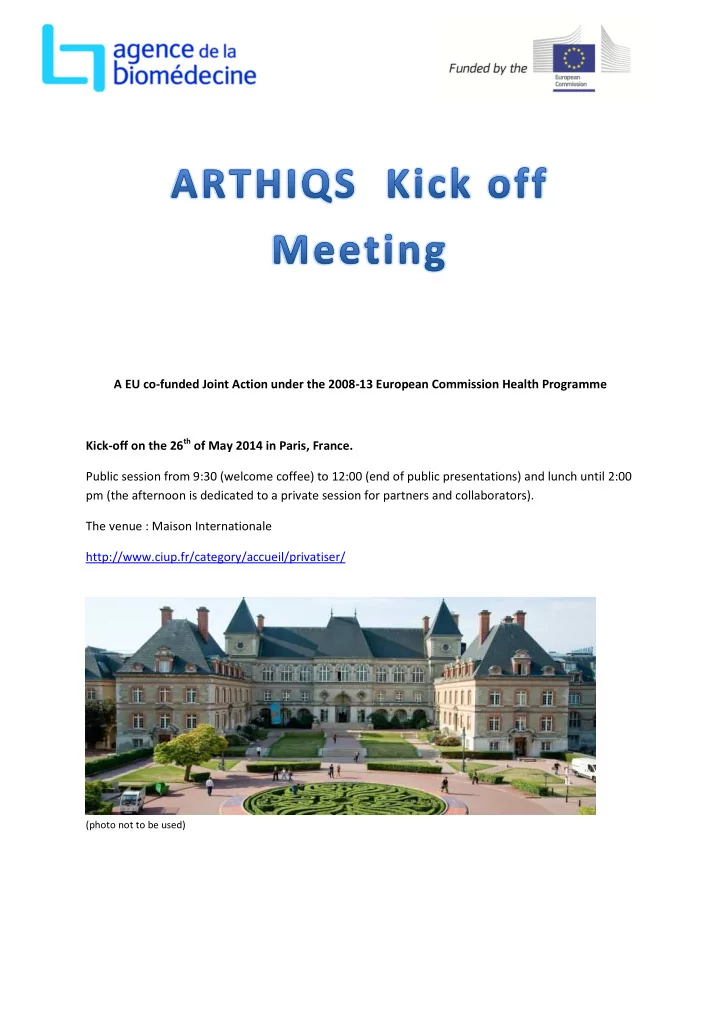

A EU co-funded Joint Action under the 2008-13 European Commission Health Programme Kick-off on the 26 th of May 2014 in Paris, France. Public session from 9:30 (welcome coffee) to 12:00 (end of public presentations) and lunch until 2:00 pm (the afternoon is dedicated to a private session for partners and collaborators). The venue : Maison Internationale http://www.ciup.fr/category/accueil/privatiser/ (photo not to be used)
(photo not to be used) ARTHIQS (Assisted Reproductive Technologies and Haematopoietic stem cells Improvements for Quality and Safety throughout Europe) is a 3 year European Joint Action funded by the European Commission under the Health Programme, dealing with Assisted Reproductive Technologies (ART) and Haematopopietic Stem cells for transplantations. ARTHIQS is gathering 16 partners and 9 collaborators from 18 different Member States. Assisted Reproductive Technologies (ART) and Hematopoietic Stem Cells Transplantation (HSCT), both involving living cell donors and recipients, fall under the 2004/23 EUTCD (European Union Tissues and Cells Directive) regulation which requires to ensure their protection, but both fields are deeply different in practices and needs. Nowadays, ART shows both public and private diverse practices within and between Member States (MS). These disparities are notably enhanced by the fact that a significant number of countries seek to have a dedicated and trained Competent Authority/ Delegated Body in order to provide expertise and controls in the field of ART (information to be provided to donors and beneficiaries, quality and safety criteria for donors and beneficiaries, selection, consent, access to fertility preservation, registries, vigilance system etc.). ARTHIQS will therefore provide: i) institutional guidelines for key aspects of service provision and regulation in ART, ii) ART-specific knowledge in each MS and so building more specific national organisations, and iii) information and training to ART centre inspectors The main outcome should be the existence in all MS, at the governmental level, of a sustainable structure: Competent Authority (or part of it)/ delegated body with a sufficient knowledge on ART issues arose both by the European regulation (EUTCD, cross border Directive) and by internal national regulation. At a time when ART demand is increasing due to societal and environmental changes, both donors and beneficiaries shall have a better access to information; additionally, the guidance provided shall impact on ART care and increase and quality and safety levels throughout EU. The European Commission (DG SANCO) should as well in turn benefit from best-informed advice and opinion from each MS for any consultation or political decision to be taken in this field. Regarding HSCT, the development of new sources (mobilized peripheral blood stem cells, cord blood) contributed to increase both the number and the age of patients receiving HSC transplants and modified medical practices. Across the EU, HSC donor follow-up is widely recognized to be insufficient, especially regarding recipient-related donors. Additionally, Cord Blood Banks (CBB) rapidly evolved to allogeneic and autologous types of banks, which are currently in competition in some countries. For these banks to be authorized, generic EU inspection guidelines following the EUTCD requirement exist, but would be worthwhile developing in accordance to the specific technical
requirements of CBB, keeping in mind that one of the main goals should be the safety of future recipients. Therefore, ARTHIQS also aims to develop guidelines for key aspects of service provision and regulation in HSCT regarding the main characteristics for HSC donor follow-up registries to be implemented both locally and at country level, and guidelines for cord blood banking i.e. covering all stages and including the minimum requirements for authorising/re-authorising CBB and the minimum quality and safety standards for CBB, regardless of their status and purpose (allogeneic/autologous, public/private), drafted along with guidelines for CBB inspectors. The recommendations concerning the set-up of an HSC donor follow-up registry will set the basic framework for establishing registries as a tool for the upgrade/improvement of safety in HSC donation. The guidelines for CBB main outcome will be the establishment of EU common good practice in the field. Overall outcome will be a significant increase in quality and safety practice in cord blood banking, and Competent Authorities/ Delegated bodies having tools to assess the compliance of their CBB thanks to the guidelines generated. This last part of the work is also aiming at broader and safer HSC availabilities for patients in the need of a HSC transplant (providing that the use of cord blood is suitable). Sustainability of work will be ensured by one training meeting aimed to representatives of all MS in both ART and HSC, and by a careful dissemination strategy relying partly on professionals and scientific societies. Coordination - France (WP1) Dissemination Evaluation- Czech Republic Sweden (WP3) (WP2) ART- France HSC - Croatia and (WP4) Italy (WP5) ARTHIQS work and responsibilities are divided in sections designated as work packages (WPs), the horizontal WPs are: Coordination (France: Agence de la biomédecine, delegated body for ART and HSC), Dissemination ( led by Czech Republic; SUKL- ART delegated body) and Evaluation (led by Sweden: IVO- The Health and Social Care Inspectorate, Competent Authority).There are two technical WPs : WP4 dealing with ART and led by France ( Agence de la biomédecine) and the WP5 on HSCT co-led by the Competent Authorities of Croatia- The Ministry of Health and Italy- ISS Centro Nationale di Trapianti) . ARTHIQS Joint Action (Grant agreement n. 20132101557886) which has received funding from the European Commission in the framework of the Health Programme. The sole responsibility lies with the author and the Consumers, Health and Food Executive Agency is not responsible of any use that may be made of the information contained here.
Recommend
More recommend